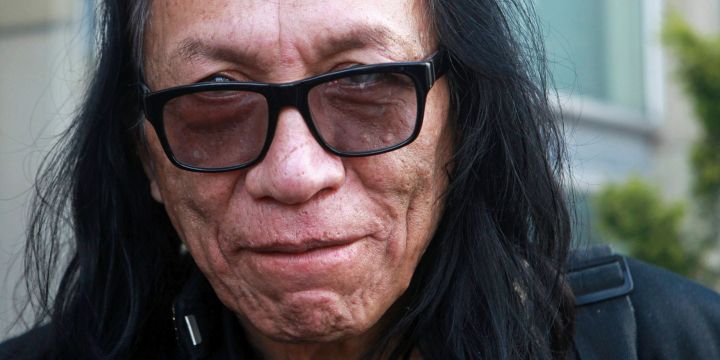FROM THE ARCHIVES
‘Maybe today, I’ll slip away…’ Sugar Man Sixto Rodriguez passes away

Sixto Rodriguez, a huge star in South Africa in the 70s and again later with the release of a documentary in 2012, passed away at the age of 81. The official Rodriguez website sugarman.org announced on Wednesday: "It is with great sadness that we announce that Sixto Diaz Rodriguez has passed away earlier today. We extend our most heartfelt condolences to his daughters – Sandra, Eva and Regan – and to all his family. Rodriguez was 81 years old. May His Dear Soul Rest In Peace."
Searching for Sugar Man, the documentary that tells the story of how 1970s musician Rodriguez came to be a huge star in South Africa while remaining unknown in the rest of the world, looks set to be a smash hit in the US. Rebecca Davis met Stephen Segerman, one of a handful of South African individuals responsible for tracking down the elusive muso and keeping his music alive.
***
You’re a man with a guitar in gritty Detroit in the early ’70s. You work in construction, do whatever you can to get by. In your spare time, you write a few songs, play a few gigs. You get picked up by a record label, and you put out two albums. They sink without trace in America. Nobody’s interested. You think, well, that’s that. You put your dreams behind you, and you get on with life.
Then, in 1998, quite by chance, you find out something amazing. You find that you are a huge star on the other side of the world. In South Africa, by some estimates, you are bigger than Elvis. But everyone thinks you are dead. You hear all this down a crackly phone line from a man in Cape Town who owns a record shop. You are sceptical – who wouldn’t be? But within nine months, your life has changed forever. You are brought to South Africa, met with limousines at the airport, and you play sold-out concerts in stadiums where the crowds scream your name until they are hoarse and know every word to the songs you wrote almost 30 years earlier and thought were long forgotten.

US folk musician Sixto Rodriguez performs on stage during a concert in the Heineken Music Hall in Amsterdam, The Netherlands, 01 July 2013. EPA/FERDY DAMMAN

US singer Sixto Rodriguez performs during a concert at the Montreux Jazz Lab on the opening night of the 47th annual Montreux Jazz Festival, in Montreux, Switzerland, 04 July 2013. EPA/SANDRO CAMPARDO
It’s a true story, so incredible that the only wonder is that it hasn’t been told on film until now. But Searching for Sugar Man, a documentary by Swede Malik Bendjelloul, is changing all that. The film was rapturously received at the Sundance Film Festival this year and has gone on to sweep America and the UK. Sixto Rodriguez, the man who thought his career was over by 1975, is set to appear on David Letterman next week. Celebrities like Alec Baldwin, Michael Moore and even Bob Dylan – to whom Rodriguez is often compared – have raved about the film. It is now virtually assured that Rodriguez will achieve the fame that eluded him for so many decades in the States, at the age of 70.
In South Africa, of course, we’ve known the story for ages. The songs of Rodriguez have been woven into the cultural fabric of South African life for decades. It is rare to find a white liberal of a certain age who has never owned a copy of Cold Fact, his first album. The song I Wonder, with its dreadfully daring speculation about the number of times a woman has had sex, is probably better known here than many Rolling Stones hits. So there is a certain sense of undeniable satisfaction in the fact that the rest of the world is only just catching up to a musician that we knew was cool decades ago.
Searching for Sugar Man is not just the story of Sixto Rodriguez’s astonishing career revival, however. It is also a story about South Africa, and how his music became a rallying point for young, mainly white South Africans frustrated by the injustices of apartheid, the conservatism of the regime and the demands of military service. It is a story, too, about the two individuals who became so fascinated by the mystery around the musician that they resolved to find out the truth about him: music journalist Craig Bartholomew and record-shop owner Stephen Segerman.
Everyone who knows Segerman calls him “Sugar”. The documentary opens with him driving along Chapman’s Peak, singing along to Rodriguez’s Sugar Man in his car. That Sugar should have found the Sugar Man is, he said, just one of the curious ways in which his life has become intertwined with that of Sixto Rodriguez.
“In the army, everyone mispronounced my surname as ‘Sugar Man’,” he explained. “Then, after military service, I moved into a commune in Joburg. There were three Stephens. So the head of the commune said, ‘Right, we’ll call you Sugar’. That’s been my name ever since.”

Musician Rodriguez. (Photo: Gallo Images / Sunday Times / Ruvan Boshoff)
It was in the army that Segerman was first exposed to the music of Rodriguez, in the early ’70s. “Of course I remember the first time I heard Rodriguez, like everybody!” he said, almost affronted by the question. He was in the Air Force at Swartkops, and once you’d finished your basic training, you could drive home to Joburg for the weekend. “I distinctly remember this guy calling me over to his car, and saying, ‘Listen, you’ve got to hear this guy.’” That was all it took.
“Rodriguez was critical in the army,” Segerman recalled, sitting in his den in Cape Town, a room lined from wall-to-wall with CDs, rock memorabilia and photos. “Him and Leonard Cohen. We just used to sit and listen. We were so depressed, and music can just take you away. I wasn’t on the border, but the guys on the border – they just swore by this guy.”
Even now, Segerman said, certain Rodriguez songs bring him straight back to that time. “If I put on ‘Crucify My Mind’, I get that ‘Fuck, I’m in the army’ feeling immediately,” he said.
Segerman’s interest in Rodriguez continued, only as a fan, for the next two decades. Then, one day somewhere around 1995 (Segerman isn’t hot on dates), he was sitting on Camps Bay Beach with a group of friends, when one of them, a South African who had emigrated to the States, brought up Rodriguez. “She asked me where she could buy a copy of Cold Fact,” Segerman remembered. “I pointed to the music shop across the road, and said, ‘Over there, of course.’ She was amazed, because she told me it wasn’t available anywhere in the States. And that was the first time I ever realised that Rodriguez wasn’t huge all over.”
Segerman was intrigued enough to start wondering what had become of Rodriguez. In South Africa, it was accepted as fact that he was dead. The most widely-believed rumour held that he had blown his brains out on stage after a bad gig. Trying to track down any information on the man, Segerman soon realised that there was none.
“How does the Google generation understand this story?” Segerman asked. “There was just no information.” He gestures to the crammed bookshelves behind him. “I collect rock books, and in this entire set of books, there’s not a single mention of him.”
The story of exactly how Rodriguez was tracked down is an extraordinary one, but to reveal it too fully here would be to spoil parts of the wonderful documentary. It was music journalist Craig Bartholomew who did most of the investigative legwork, spurred on by liner notes written by Segerman for the release of the Coming from Reality CD in South Africa in 1996.
Let us fast-forward, then, to 15 September 1997, when Segerman’s phone rang at 1am. “It was that phone,” Segerman said, pointing to a blue telephone in the corner of the den. (Like Rodriguez, Segerman doesn’t own a cell phone.) On the line was none other than his musical hero, Rodriguez. Segerman shook his head when asked to recall the content of the call, clearly still in awe, almost 15 years later. “I mostly just told him how massive he was in South Africa. I told him that if he came here, he wouldn’t believe how popular he was.”
Was Rodriguez convinced? Segerman paused. “He has this saying: ‘You don’t take candy from a stranger.’ It was a pretty major revelation. I mean, it’s a big day for a dude who’s waited 30 years for a career.”
In the documentary, Segerman described the phone call as the best moment of his life. “Other than my wedding,” he later qualified. “But if that was the last thing that had happened, it would have sufficed. That would have been the most amazing moment of my life. But it just keeps happening. Then he started touring, then we have this movie…”
It took nine months to get Rodriguez to South Africa to play. The night he arrived was the first time Segerman met him. After such a build-up, there must be a chance that encountering your icon in the flesh proves disappointing. Anything but, said Segerman.
“You’re hoping that he’s going to be this hip Dylan-esque character and he is, but more,” he said. “He’s not completely at your disposal. I’ve spent a lot of time with him by now, we’ve had some good raps, but, y’know, he holds a lot back. He’s got a lot of real mystery about him.”
Rodriguez has been to South Africa many times since. (On that first tour, in 1998, his daughter Eva met and fell in love with a South African man, and now lives in Wilderness.) “He loves it here,” said Segerman. “He walks up and down Kloof Street, and everyone knows who he is.” He tells the story of visiting Kalk Bay with Rodriguez on a Sunday afternoon.
“We walked all the way out to the pier. On the way back, there’s these drunk fishermen sitting there. And as we walk closer, one of them just starts singing ‘I Wonder’. I couldn’t believe it!” Segerman recalls. “Then they all got up to give him hugs.”
Searching for Sugar Man took three years to make, shot on a shoestring budget. As an illustration of the budgetary constraints, Segerman tells how director Bendjelloul shot some of the footage using a Super 8 app on his cell phone. Its first screening was at Sundance, and they knew it was going to be huge when the film was selected as one of the three to be shown on opening night. The film received a standing ovation, and when Rodriguez was brought on stage for the Q&A, the crowd went crazy. Segerman was there.
“It was just a magical night,” he said. “There was snow everywhere… it was a trip.”
When Segerman talks about what has happened, he does so in almost mystical terms, as a disciple whose function it is to ensure that his hero receives the recognition that is his due. “We just wanted this guy to be huge in America, because he deserves it,” he said. “I’m happy to be part of the story, but really, truly, this is about Rodriguez. And it couldn’t have happened to a nicer person. He’s a mensch. He’s a gentleman. You can’t swear in front of him.”
Segerman smiled as he hit on an analogy. “You know that video of Chad le Clos’s father, Bert le Clos, after Chad won the gold medal? And everyone’s like, How does that oke feel? I’m like, I know!”
Despite being a starring character in the documentary, Segerman’s life hasn’t changed. He still runs Mabu Vinyl on Rheede Street, though he said he has had a few people come in to see the shop on the back of the movie. “I have a wonderful record shop. I have a wonderful job. I am very happy, very content with my life and what I do.”
There’s one question which seems almost churlish to ask, but I do it anyway: Has Rodriguez ever thanked Segerman for helping him revive his career? He looks astonished by the suggestion. “Me?” he asked. “Oh, ja. Jeez, ja. He has acknowledged the people who have played a role. But that’s like…You know what, he doesn’t have to. It’s an honour.” DM
- This article was originally published on 3 August 2012. Searching for Sugar Man will be released by Sony and Ster Kinekor at Cinema Nouveau theatres on 31 August 2023.














 Become an Insider
Become an Insider